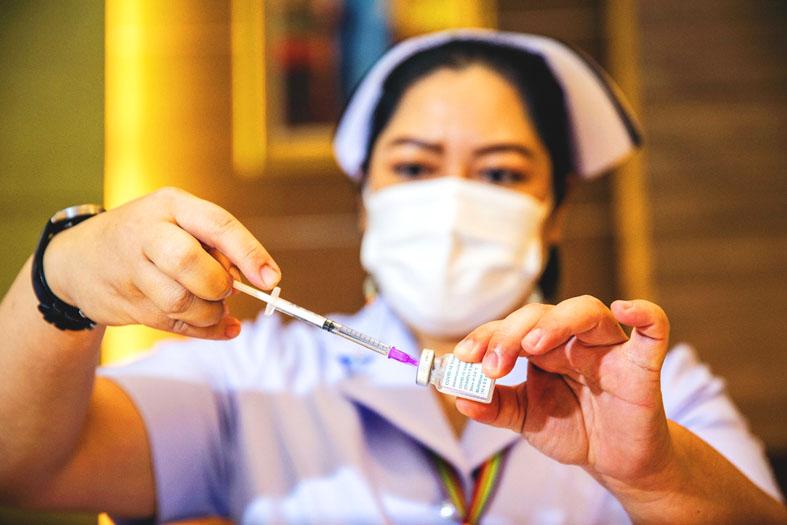Thailand yesterday joined several European nations in suspending the AstraZeneca vaccine over blood clot fears, despite a range of health authorities around the world insisting it was safe.
The move came just hours after US President Joe Biden offered COVID-19-weary Americans hope of a return to some kind of normality by July 4, marking the national holiday as his target for “independence” from the virus.
After a shaky start, the US has ramped up its vaccination program, following the advice of scientists who say jabs are the only way out of a pandemic that has killed 2.6 million people around the world.

Photo: Bloomberg
Global hopes received a blow on Thursday when Denmark, Iceland, Italy, Norway and Romania postponed or limited the rollout of their quota of Oxford-AstraZeneca vaccines after isolated reports of recipients developing blood clots.
Thailand and Bulgaria followed suit yesterday.
Health regulators said that there was no evidence of any link, but they were acting out of an abundance of caution.
Australia, Mexico and the Philippines said they would continue their rollouts, as they had found no reason to alter course. Canada said there was no evidence the jab causes adverse reactions.
Thailand’s decision led to the embarrassing spectacle of Thai Prime Minister Prayuth Chan-ocha abruptly canceling his own televised jab.
“Vaccine injection for Thais must be safe, we do not have to be in a hurry,” said Piyasakol Sakolsatayadorn, an adviser for the country’s COVID-19 vaccine committee.
The WHO said there was no reason to stop using AstraZeneca’s vaccine.
“Yes, we should continue using the AstraZeneca vaccine,” WHO spokeswoman Margaret Harris said, adding: “There is no indication to not use it.”
In the US, Biden laid out the path for escape from the darkest days of the pandemic in the world’s worst-hit country.
“This fight is far from over,” Biden said in his first televised primetime address as president, delivering an emotional tribute to the more than 530,000 Americans who have died from COVID-19.
Americans could overcome the virus if they worked together and followed health experts’ guidelines on wearing masks and getting vaccinated, he said.
“Just as we are emerging from a dark winter into a hopeful spring, and summer is not the time to not stick with the rules,” he said.
If Americans stay the course, they might be able to mark their cherished July 4 national holiday in somewhat normal circumstances, with a backyard cookout, he said.
“That will make this Independence Day something truly special where we not only mark our independence as a nation, but we begin to mark our independence from this virus,” he said.

CHAOS: Iranians took to the streets playing celebratory music after reports of Khamenei’s death on Saturday, while mourners also gathered in Tehran yesterday Iranian Supreme Leader Ayatollah Ali Khamenei was killed in a major attack on Iran launched by Israel and the US, throwing the future of the Islamic republic into doubt and raising the risk of regional instability. Iranian state television and the state-run IRNA news agency announced the 86-year-old’s death early yesterday. US President Donald Trump said it gave Iranians their “greatest chance” to “take back” their country. The announcements came after a joint US and Israeli aerial bombardment that targeted Iranian military and governmental sites. Trump said the “heavy and pinpoint bombing” would continue through the week or as long

TRUST: The KMT said it respected the US’ timing and considerations, and hoped it would continue to honor its commitments to helping Taiwan bolster its defenses and deterrence US President Donald Trump is delaying a multibillion-dollar arms sale to Taiwan to ensure his visit to Beijing is successful, a New York Times report said. The weapons sales package has stalled in the US Department of State, the report said, citing US officials it did not identify. The White House has told agencies not to push forward ahead of Trump’s meeting with Chinese President Xi Jinping (習近平), it said. The two last month held a phone call to discuss trade and geopolitical flashpoints ahead of the summit. Xi raised the Taiwan issue and urged the US to handle arms sales to

State-run CPC Corp, Taiwan (CPC, 台灣中油) yesterday said that it had confirmed on Saturday night with its liquefied natural gas (LNG) and crude oil suppliers that shipments are proceeding as scheduled and that domestic supplies remain unaffected. The CPC yesterday announced the gasoline and diesel prices will rise by NT$0.2 and NT$0.4 per liter, respectively, starting Monday, citing Middle East tensions and blizzards in the eastern United States. CPC also iterated it has been reducing the proportion of crude oil imports from the Middle East and diversifying its supply sources in the past few years in response to geopolitical risks, expanding

Pro-democracy media tycoon Jimmy Lai’s (黎智英) fraud conviction and prison sentence were yesterday overturned by a Hong Kong court, in a surprise legal decision that comes soon after Lai was jailed for 20 years on a separate national security charge. Judges Jeremy Poon (潘兆初), Anthea Pang (彭寶琴) and Derek Pang (彭偉昌) said in the judgement that they allowed the appeal from Lai, and another defendant in the case, to proceed, as a lower court judge had “erred.” “The Court of Appeal gave them leave to appeal against their conviction, allowed their appeals, quashed the convictions and set aside the sentences,” the judges